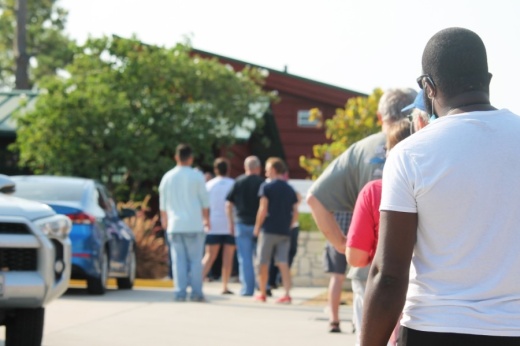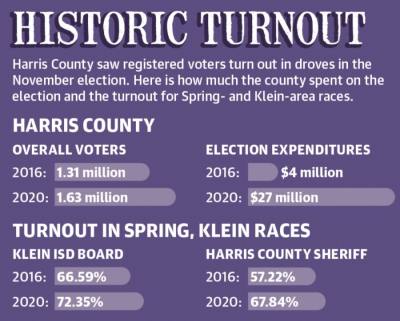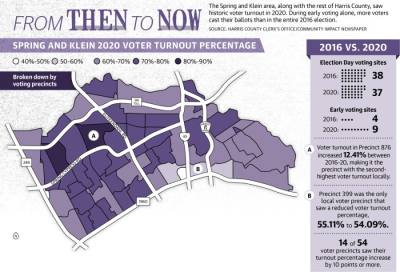Extensive voter outreach programs in Harris County may have contributed to the historic voter turnout in the Spring and Klein areas for the Nov. 3 election, experts said.
Voter turnout in the 2020 election was the highest ever, and local turnout mirrored a greater trend countywide and statewide as more voters cast their ballots during early voting than all of the 2016 election.
In the Spring and Klein area, more than 160,000 voters voted early—almost 40% more than the entire 2016 presidential election in the area, according to the Harris County Clerk’s Office.
County officials and political experts point to the presidential race and voter outreach programs launched in Harris County as contributing factors to turnout.
“We have an unprecedented amount of access to the polls. We have more days of early voting than we’ve ever had before, more locations to early vote than we’ve ever had before,” said Roxanne Werner, the director of community relations for the clerk’s office. “We have 120 locations, so that’s triple the amount that we had in 2016.”
However, these initiatives have not been without challenges, and not all survived to Election Day. The Texas Republican Party filed a lawsuit against the clerk’s office to prevent drive-thru voting, a challenge that lasted up to the day before Election Day.
Additionally, the county’s attempt to send mail-in ballot applications to all residents was blocked by the Texas Supreme Court on Oct. 7.
Linda Bowers, a Spring resident, said she has been “very good” with safety measures around the coronavirus pandemic, and although she started to vote by mail, she chose to vote in person.
“I felt there was a strong contingent trying to limit absentee and mail-in votes,” she said. “I felt it was very important that I actually go to the polls and vote in person.”
How the turnout turned out
Republican and Democratic experts pointed to frustration toward the ongoing pandemic as one of driving forces behind the record-breaking turnout in the Spring and Klein area.
Francisco “Quico” Canseco, a former Republican U.S. representative from Texas and the director of the conservative Texas Public Policy Foundation’s Election Protection Project, said he believes the pandemic affected turnout.
“It has brought out a lot of people and made them realize that, ‘If I can stand in line at a grocery store with a mask and gloves and staying 6 feet apart, I can certainly go and vote,’” he said.
Increasing advertising spending, adding staffers and changing voter demographics also helped drive the county’s turnout, said Angelica Luna-Kaufman, the communications specialist with the Harris County Democratic Party.
Alán M. De León, Houston advocacy organizer for the statewide nonpartisan nonprofit MOVE Texas, said he believes the converging public health, economic and environmental crises as well as the county’s new voting infrastructure affected turnout.
“The county in 2016 invested $4 million to facilitate that election,” De León said. “This year, it’s close to $30 million.”
In August, Harris County Clerk Chris Hollins told commissioners he would spend $27 million of election funding to create voting infrastructure for the Nov. 3 election, such as recruiting poll workers and launching 24-hour and drive-thru voting centers.
The drive-thru locations—which Hollins said were first implemented in the July runoff to keep voters safe amid the pandemic—consistently saw higher numbers than their in-person counterparts in the general election, per early-voting data from the clerk’s office.
The Texas Republican Party filed a lawsuit to stop drive-thru voting Oct. 12. The case was dismissed by Texas’ 14th Court of Appeals, the Texas Supreme Court and U.S. District Judge Andrew Hanen.
However, Texas Republicans continued to seek appeals. On Nov. 2, Hollins announced Harris County would close all but one drive-thru site to prevent any votes being declared invalid.
“My job is to protect the right to vote for all Harris County voters, and that includes those who are going to vote on Election Day,” Hollins said on Twitter. “I cannot in good faith encourage voters to cast their votes in tents if that puts their votes at risk."
However, De León said although Texas Republicans argued in court the programs exposed the election to a risk of voter fraud, there is no evidence drive-thru voting caused fraud.
“We’re going to continue to advocate for options like drive-thru voting and widely available ballot drop-off sites,” De León said. “We know that these are safe ways for people to get involved in our elections without the risk of voter fraud.”
Looking locally
More than 200,000 ballots were cast on Election Day countywide, not including the estimated 1.4 million early-voting ballots, according to Hollins. In the Spring and Klein area, 161,109 voters cast their ballots during early voting alone. Among the 54 Spring- and Klein-area voting precincts, this election had four more polling sites than in 2016.
Although turnout was high, few positions actually changed hands. Most partisan races in the Spring and Klein area did not flip, including for incumbent Republicans such as District 2 U.S. Rep. Dan Crenshaw, District 126 state Rep. Sam Harless and District 150 state Rep. Valoree Swanson.
“There was definitely a Republican wave that benefited down-ballot Republicans, and it showed that locally, the Republican brand was still strong despite some dissatisfaction with Donald Trump,” said Brandon Rottinghaus, a University of Houston political science professor.
In local races, all incumbents were re-elected except for in Klein ISD. Trustee Doug James, who also serves as the board president, was projected to lose to Alvin Vaughn by a slim margin of 10 votes, according to unofficial voting results as of press time Nov. 11.
The turnout for the KISD board of trustee races was 118,224 of 163,399 registered voters within KISD’s boundaries—a 72.35% turnout for both races. In the 2016 KISD election, 95,118 of 142,846 registered voters participated, a turnout of 66.59%.
Turnout hovered between 60% to 70% in other races. Harris County Sheriff Ed Gonzalez, a Democrat, won re-election with a 67.84% turnout versus his 2016 win with a 57.22% turnout.
Matt Dulin contributed to this report.








